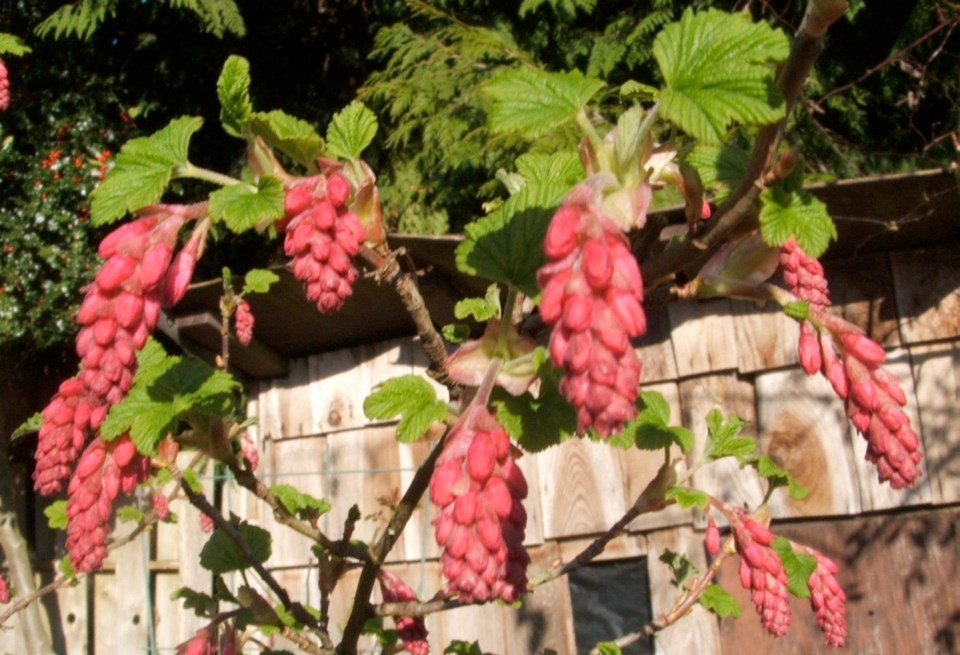Most of my friends, normally very busy people, suddenly have time on their hands. Exercise classes, book and bridge clubs, gathering places, locations¬Ýwhere they volunteer ‚Äî all¬Ýshut down.
One friend is usually busy caring for the homes and pets of people away on vacation. Cessation of travel cancelled all her booked jobs. Another, just home from Mexico, is in isolation.
As soon as all gatherings in groups were stopped, two of my newly unoccupied friends offered to help occasionally in the garden.
The first ‚Äúcompanion gardening‚Äù session has happened, when a friend who is a recently retired physician came to help for around two hours on a sunny morning. We worked in the same large area of the garden, far apart but within earshot of each other to¬Ýallow for some conversation.
My friend weeded and lightly cultivated a small bed whose feature plant is¬Ýa red flowering currant on the verge of full bloom, accompanied by lavender, heather and flowering hyacinths.
I worked on raking a large clearing to make it even before giving it a fresh look with shavings laid over sheets of cardboard and thick layers of saved newspaper as weed barriers. The area used to have garden beds, but roots from the neighbours‚Äô thick forest of now¬Ýskyscraper-high cedar and fir trees next to my side fence have made that impossible. When the refurbishing is done, the space will be reconstituted as¬Ýa sitting-out area with two chairs, spaced well apart, and a small table between them.
The two of us used separate tools. We wore gloves, and spoke with each other at a distance. But we had a good visit just the same. Physical distancing does not mean that socializing must cease.
Checking for safety. Still, I wanted to¬Ýbe¬Ýcertain that I was hosting helpers safely in the garden. When I didn‚Äôt manage to get through on the recommended information phone line, I contacted Dorothy and Kathryn, who organize volunteer workers in the Government House gardens.
I had noticed that, though they cancelled a planned orientation session for potential volunteers, they still were inviting anyone interested in volunteering in the gardens to contact them at¬Ý[email protected]. I asked them how they were managing groups working in the gardens.
Dorothy replied with enormously helpful information. On the day I contacted her, she and Kathryn had just received official word on the matter from the website of the Lieutenant Governor.
The statement says that the grounds of Government House are open to the public, but visits must not be made in large groups and physical distancing must be maintained at all times.
‚ÄúWe recognize the value of community to combat isolation, as well as the therapeutic benefits of gardening, and so you may see members of our volunteer corps, the¬ÝFriends of Government House Gardens Society, working on the property. The Friends will continue practicing social distance gardening as long as it is safe to do so.‚Äù
Dorothy then added her own observations. First, each volunteer gardener is deciding whether or not to continue with the group. ‚ÄúMost people have their own hand tools and gardening gloves have always been recommended.‚Äù Volunteers can choose to use larger and¬Ýshared equipment as long as gloves are worn.¬Ý¬Ý¬Ý
Dr. Bonnie Henry, B.C.’s public health officer, has encouraged people to go outside while maintaining physical distancing from each other. For many of us, our gardens are fresh-air sanctuaries from the worrying uncertainties swirling about us.
A golden moment. On the few occasions when I’ve ventured out to purchase necessities, and observed elaborate precautions established in stores, I’ve also taken note of the many anxious faces around me. Each time, the concept of the “refiner’s fire” has leapt to mind. It is seen often in the Bible, as prophets and others speak of people being purified by trials as silver and gold are purified of dross by fire.
As awful as the present moment is, could it possibly be viewed also as the chance of a lifetime to come out of it a better people?
Maybe, we’ll emerge from this trial a little more kind and compassionate, and better aware of gaps and flaws in addressing the greatest needs in our society.
A recent news program I watched featured a panel discussing urgently needed steps to curtail contagion. One participant saw this time in history as full of pain but also potential to effect change for the better. He called it “Our Golden Moment.”



